
by Craig Russell, NOAA Office of Ocean Exploration and Research
June 22, 2019
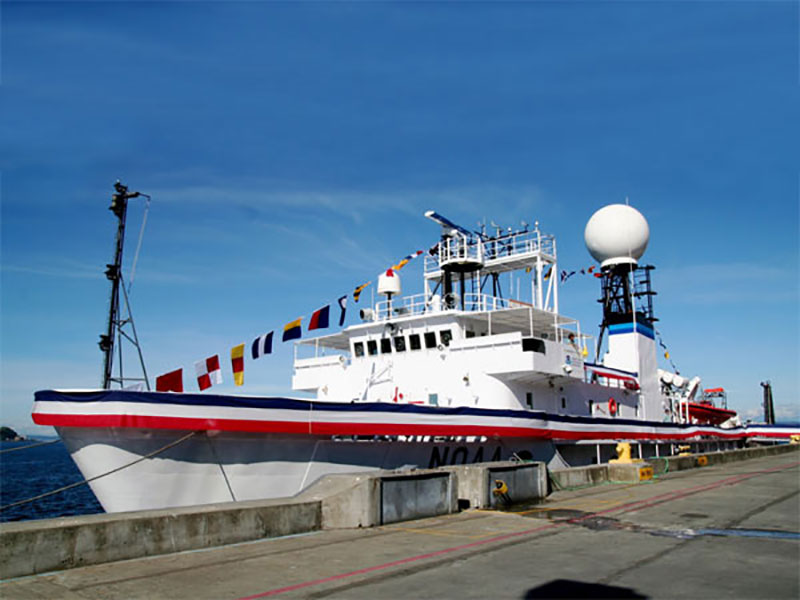
NOAA Ship Okeanos Explorer, in full dress for her 2008 Commissioning Ceremony, celebrates her 100th exploration mission June 20 - July 12, 2019. Image courtesy of the NOAA Office of Ocean Exploration and Research. Download image (jpg, 75 KB).
This week, NOAA Ship Okeanos Explorer, with a dedicated team both aboard and on shore, sets sail on its 100th ocean exploration mission. It is fitting that this milestone expedition to explore the deep and mostly unexplored ocean off the southeastern United States begins at the hub of our nation’s space exploration program – Cape Canaveral, Florida. The Space Coast launched humans to new heights, led to advances in technologies that have changed lives, and opened our minds to unimaginable insights into our planet and universe through groundbreaking science, engineering, and compelling images. The Okeanos Explorer and other ocean exploration programs and vessels do just that – just closer to home at new depths in our underwater backyard ocean, here on Earth.
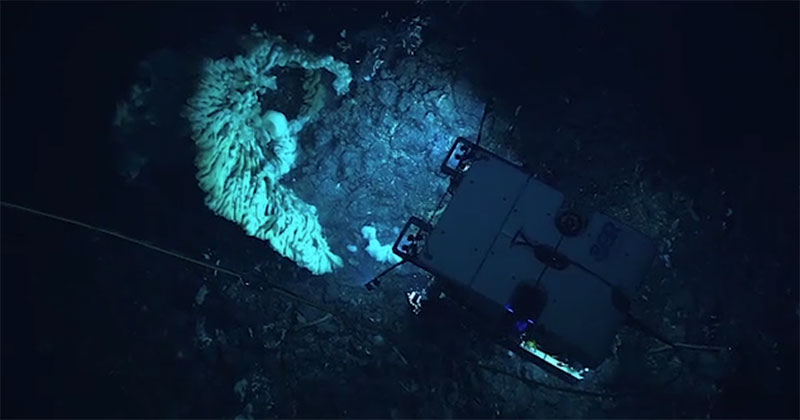
This sponge is the largest sponge documented to date, close to 3.7 meters (12 feet long) and 2.1 meters (7 feet) wide, comparable in size to a minivan. It was documented during the 2015 Hohonu Moana: Exploring Deepwaters off Hawaiʻi expedition aboard NOAA Ship Okeanos Explorer while exploring deepwater habitats in the Papahānaumokuākea Marine National Monument using remotely operated vehicles at depths ranging between 700-4,875 meters (2,300–16,000 feet). Image courtesy of NOAA Office of Ocean Exploration and Research, 2015 Hohonu Moana. Download larger version (jpg, 466 KB).
Over the course of 100 Okeanos Explorer expeditions, we explored the ocean from Indonesia to the Central and Western Pacific, from the Gulf of Mexico to the Western Atlantic and Caribbean. We mapped over 1.5 million square kilometers of previously unknown seafloor, observed dozens of potential new species or marine animal range extensions, discovered the largest known sponge on Earth, witnessed new behaviors in deep-sea organisms, found lost shipwrecks, and revealed a massive province of deep methane seeps along the eastern U.S. continental margin. More recently, we also proved the efficiency of telepresence-based mapping from shore and helped discover potentially the largest deep-sea coral reef in the United States, just off the southeast U.S. seaboard. Discoveries like these yield immediate value for society, while openly shared data lays the foundation for future understanding of our complex ocean.
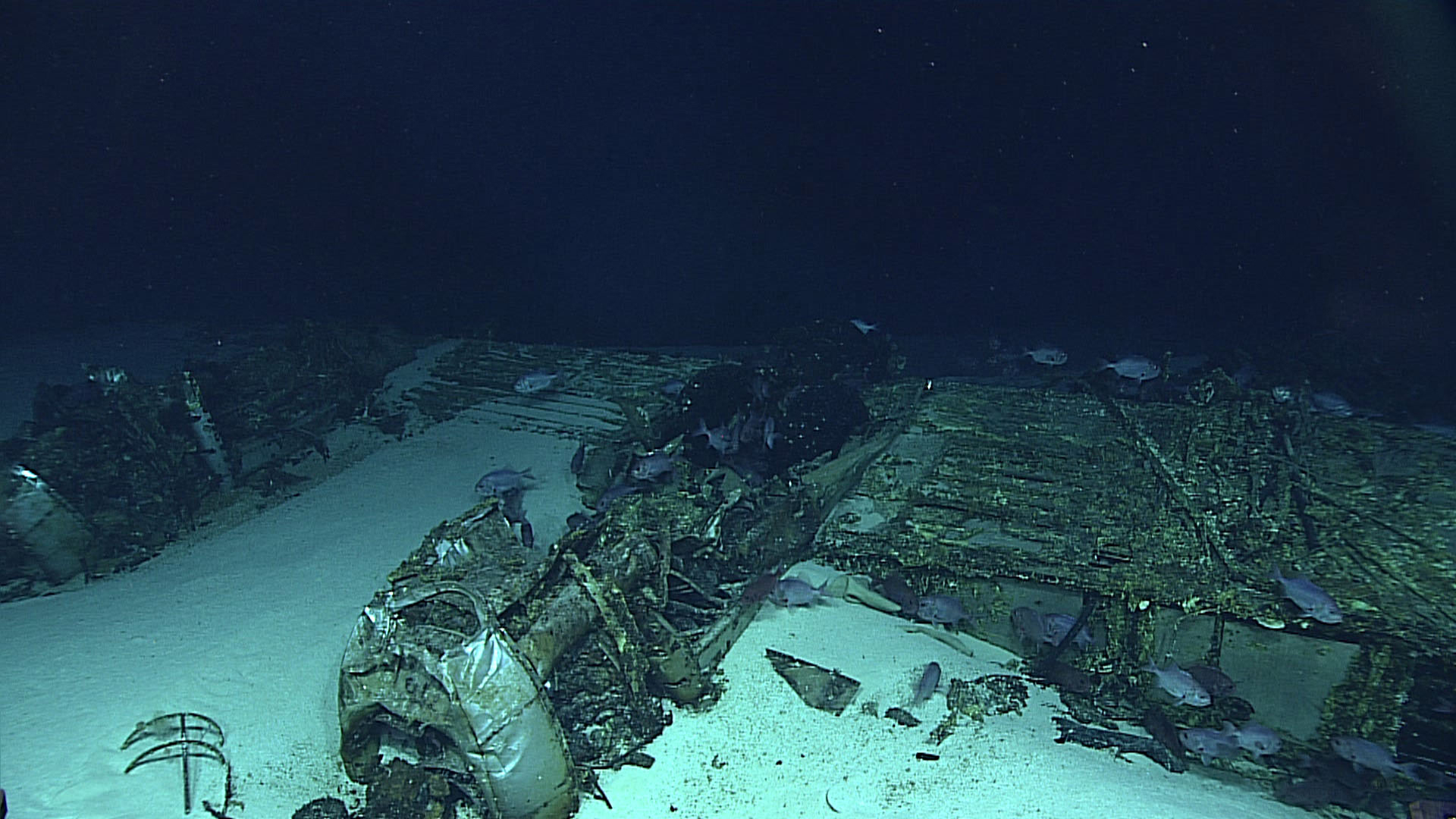
There are not just ships in the deep ocean wanting to be uncovered, there are other artifacts of our past, including this aircraft lost in the vicinity of Tinian and Saipan. This B-29 Superfortress aircraft, one of the largest aircraft flown by the United States in World War II, was discovered in 2016 using our remotely operated vehicle, Deep Discoverer. Image courtesy of NOAA Office of Ocean Exploration and Research, 2016 Deepwater Exploration of the Marianas. Download larger version (jpg, 765 KB).
Despite the difference in vantage, the ocean and space exploration enterprises have one thing in common that underpins our success: people. People from all walks of life work together across sectors and disciplines and share their talents and passion towards the common goal of exploration to expand the limits of human technology and understanding.
Just a few days ago, we bid farewell to CDR Johnson and welcomed CDR Manning as the sixth Commanding Officer of the Okeanos Explorer. The formal maritime Change of Command ceremony marks the change in this very important role.
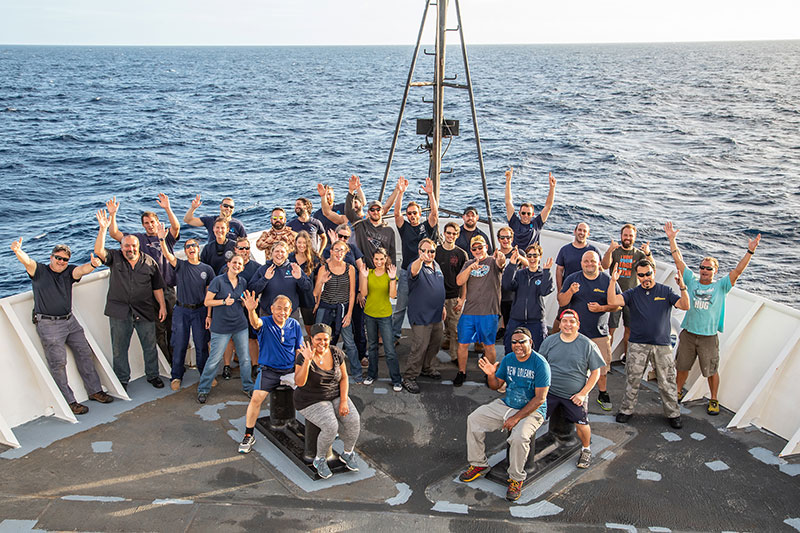
It takes a team of people from every department on board NOAA Ship Okeanos Explorer to help make each one of these 100 expeditions a success. Image courtesy of NOAA Office of Ocean Exploration and Research, Océano Profundo 2018. Download larger version (jpg, 3.7 MB).
Also, each year hundreds of people across dozens of organizations work tirelessly, often behind the scenes, to develop the schedule, procure supplies, identify science and management priorities, obtain ship time, design new capabilities, secure financing, and implement ship and system maintenance and upgrades all before the ship sails. From envisioning the ship and its mission, converting it from a Cold War relic to a state-of-the-art exploration platform, and conducting 100 expeditions, countless talented people made the Okeanos Explorer the success it is today.
So, for this 100th expedition, we not only celebrate the remarkable history and scientific achievements of the Okeanos Explorer, we also say thanks and Bravo Zulu to all the explorers—expedition managers, engineers, scientists, administrative professionals, NOAA Corps officers, professional mariners, hydrographers, marine resource managers, shipyard workers, telepresence engineers, permit processors, data managers, human resource professionals, vendors, grants and contracts managers, budget and finance officers, facilities personnel, student interns, security officers, IT and web programmers, food and health services providers, educators, communicators, graphic designers, and many, many more. And we say thanks to you the public – this is your ship of exploration, and your 100th mission!
Help us celebrate our 100th cruise and all the people who make it possible by banding together to make this Windows to the Deep 2019 ocean exploration expedition the most-watched expedition ever! Tune in and spread the excitement of ocean exploration by sharing links to the live video. And join the onboard team live at 1 pm ET June 27 for a Facebook Live interaction to learn about the latest discoveries from Okeanos Explorer.
Onward and downward!
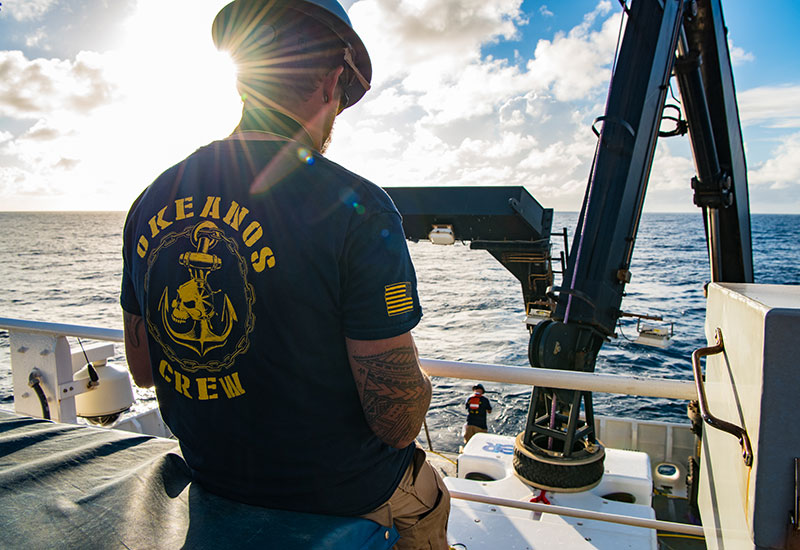
NOAA Ship Okeanos Explorer’s crew are essential to completing each of the ship's operations, including the recovery of the remotely operated vehicle Deep Discoverer, as seen here. Image courtesy of NOAA Office of Ocean Exploration and Research, Océano Profundo 2018. Download larger version (jpg, 4.0 MB).